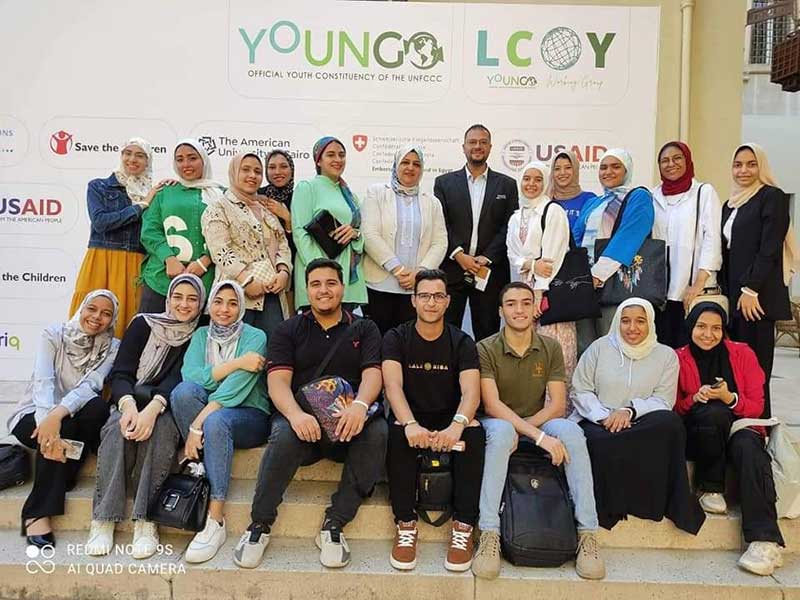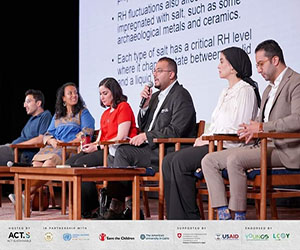
The Faculty of Archeology participates in a workshop on the challenges of climate change and the protection of cultural heritage
Under the auspices of Prof. Dr. Mahmoud El-Meteini, President of Ain Shams University, Prof. Dr. Abdel Fattah Saoud, Vice President for Education and Student Affairs, Prof. Dr. Ayman Saleh, Vice President for Postgraduate Studies and Research, Prof. Dr. Ghada Farouk, Acting Vice President for Community Service and Environmental Development, Prof. Dr. Hossam Tantawi, Acting Dean of the Faculty of Archeology, Prof. Dr. Ahmed Al-Shawki, Vice Dean of the Faculty of Archeology for Graduate Studies and Community Service and Environment Affairs, Prof. Dr. Mamdouh El-Damaty, supervisor of the Department of Archeology and Excavations, former Minister of Antiquities, and Prof. Dr. Mohamed Ibrahim Ali, Supervisor of the Department of Museums and Archaeological Sites Management and the former Minister of Antiquities, the Faculty of Archeology participated in the workshop and open discussion organized by the Regional Office of the United Nations Educational, Scientific and Cultural Organization (UNESCO) in Egypt in cooperation with the International Climate Change Youth Conference LCOY 2022 entitled “Climate Change Challenges and Protection Cultural Heritage” hosted by the American University in Cairo on October 8 and 9, 2022.
This comes as a prelude to Egypt's hosting of the Conference of the States Parties to the United Nations Climate Change Convention COP27 in Sharm El-Sheikh next November.
The workshop was opened by Dr. Bishr in front of the head of the UNESCO Regional Office in Cairo, and moderated the discussion a. Ayman Abdel Mohsen, Director of Heritage Projects at the UNESCO Regional Office in Cairo.

Participation was made by presenting a research study prepared by a. Islam Ezzat, assistant teacher at the Department of Museums and Archaeological Sites Management, at the Faculty of Archeology, in cooperation with Dr. Patrick de Martineau of Cergy Pontoise University in Paris and Dr. Faisal Busta, a microbiologist at the Center for the Preservation of Historic Monuments in Paris, on the impact of climate change on archaeological sites and museum collections in Egypt, by presenting cases of archaeological sites and museum pieces damaged by the impact of climate changes during the last decade, such as: some of the museum collections at the Egyptian Museum in Cairo and the sites of the Abu Mina Monastery Inscribed on the World Heritage List, the Hawara pyramid in Fayoum and the Shatby cemetery in Alexandria, the study also presented ways of adapting and mitigating the impact of climate change through models that have been applied in some European museums to use alternative energy in museums and move towards bio-reactors in order to transform the concept of "sustainable green museums" Musée durable Through the use of natural, environmentally friendly materials in museum display and museum lighting, as well as in maintenance and restoration work.
This study is currently being applied in some Egyptian museums in cooperation between the Faculty of Archeology, Ain Shams University, the Ministry of Tourism and Antiquities and a team specialized in the preventive maintenance of museums at Cergy Pontoise University in Paris, the Center for the Conservation of Historic Monuments in Paris, and the Archaeological Studies Department of the French Scientific Institute of Oriental Archeology.
Dr. Samar Hamdoun, a lecturer in the Department of Museums and Archaeological Sites Management, in addition to 22 students from all departments, who actively participated in discussions about the effects of climate change on archaeological sites and museums, as well as workshops and working groups on civil society initiatives to confront the impact of climate change on heritage Cultural, sustainability, biodiversity, waste management and the future of green technology in Egypt.
.svg)



